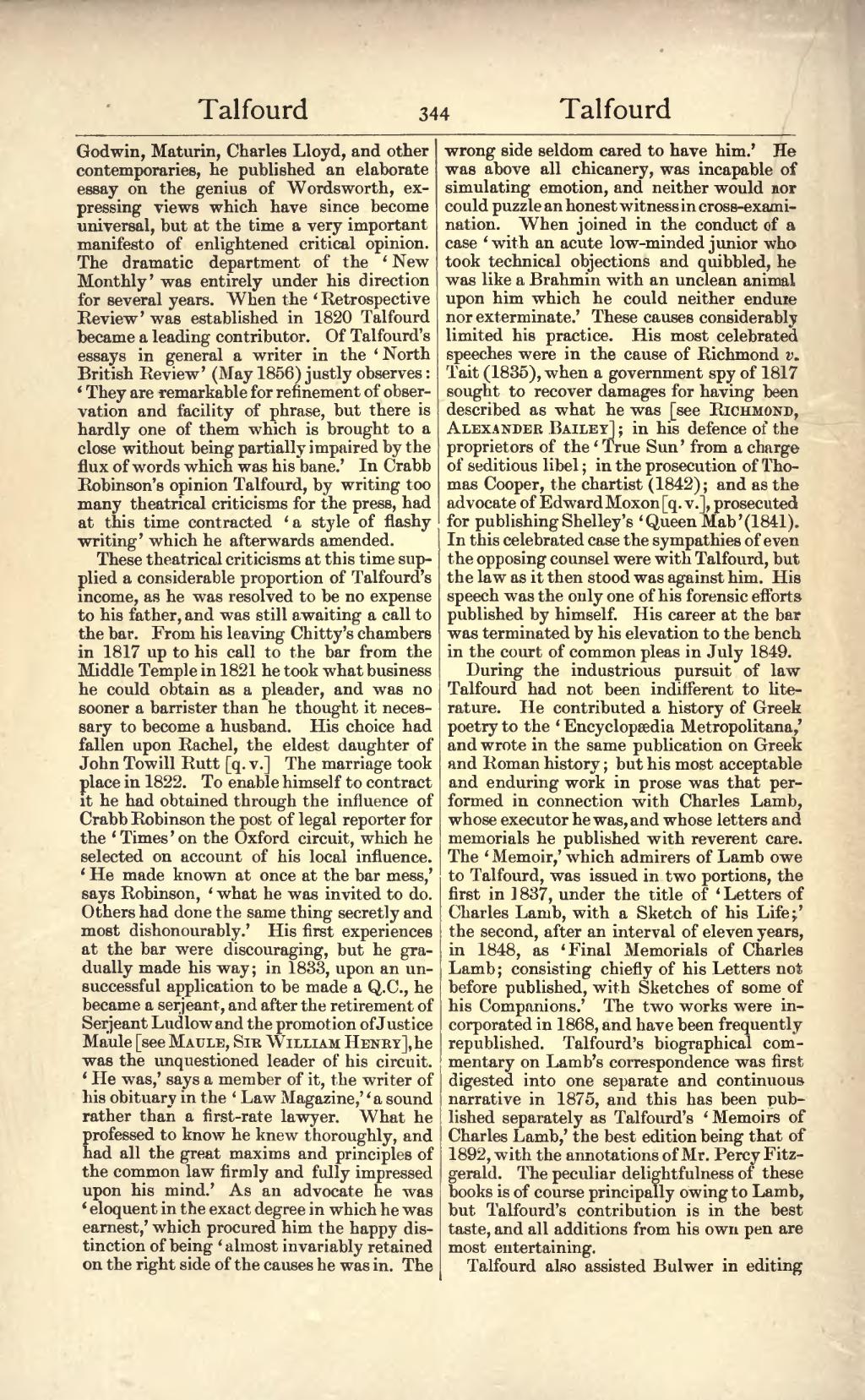Godwin, Maturin, Charles Lloyd, and other contemporaries, he published an elaborate essay on the genius of Wordsworth, expressing views which have since become universal, but at the time a very important manifesto of enlightened critical opinion. The dramatic department of the ‘New Monthly’ was entirely under his direction for several years. When the ‘Retrospective Review’ was established in 1820 Talfourd became a leading contributor. Of Talfourd's essays in general a writer in the ‘North British Review’ (May 1856) justly observes: ‘They are remarkable for refinement of observation and facility of phrase, but there is hardly one of them which is brought to a close without being partially impaired by the flux of words which was his bane.’ In Crabb Robinson's opinion Talfourd, by writing too many theatrical criticisms for the press, had at this time contracted ‘a style of flashy writing’ which he afterwards amended.
These theatrical criticisms at this time supplied a considerable proportion of Talfourd's income, as he was resolved to be no expense to his father, and was still awaiting a call to the bar. From his leaving Chitty's chambers in 1817 up to his call to the bar from the Middle Temple in 1821 he took what business he could obtain as a pleader, and was no sooner a barrister than he thought it necessary to become a husband. His choice had fallen upon Rachel, the eldest daughter of John Towill Rutt [q. v.] The marriage took place in 1822. To enable himself to contract it he had obtained through the influence of Crabb Robinson the post of legal reporter for the ‘Times’ on the Oxford circuit, which he selected on account of his local influence. ‘He made known at once at the bar mess,’ says Robinson, ‘what he was invited to do. Others had done the same thing secretly and most dishonourably.’ His first experiences at the bar were discouraging, but he gradually made his way; in 1833, upon an unsuccessful application to be made a Q.C., he became a serjeant, and after the retirement of Serjeant Ludlow and the promotion of Justice Maule [see Maule, Sir William Henry], he was the unquestioned leader of his circuit. ‘He was,’ says a member of it, the writer of his obituary in the ‘Law Magazine,’ ‘a sound rather than a first-rate lawyer. What he professed to know he knew thoroughly, and had all the great maxims and principles of the common law firmly and fully impressed upon his mind.’ As an advocate he was ‘eloquent in the exact degree in which he was earnest,’ which procured him the happy distinction of being ‘almost invariably retained on the right side of the causes he was in. The wrong side seldom cared to have him.’ He was above all chicanery, was incapable of simulating emotion, and neither would nor could puzzle an honest witness in cross-examination. When joined in the conduct of a case ‘with an acute low-minded junior who took technical objections and quibbled, he was like a Brahmin with an unclean animal upon him which he could neither endure nor exterminate.’ These causes considerably limited his practice. His most celebrated speeches were in the cause of Richmond v. Tait (1835), when a government spy of 1817 sought to recover damages for having been described as what he was [see Richmond, Alexander Bailey]; in his defence of the proprietors of the ‘True Sun’ from a charge of seditious libel; in the prosecution of Thomas Cooper, the chartist (1842); and as the advocate of Edward Moxon [q. v.], prosecuted for publishing Shelley's ‘Queen Mab’ (1841). In this celebrated case the sympathies of even the opposing counsel were with Talfourd, but the law as it then stood was against him. His speech was the only one of his forensic efforts published by himself. His career at the bar was terminated by his elevation to the bench in the court of common pleas in July 1849.
During the industrious pursuit of law Talfourd had not been indifferent to literature. He contributed a history of Greek poetry to the ‘Encyclopædia Metropolitana,’ and wrote in the same publication on Greek and Roman history; but his most acceptable and enduring work in prose was that performed in connection with Charles Lamb, whose executor he was, and whose letters and memorials he published with reverent care. The ‘Memoir,’ which admirers of Lamb owe to Talfourd, was issued in two portions, the first in 1837, under the title of ‘Letters of Charles Lamb, with a Sketch of his Life;’ the second, after an interval of eleven years, in 1848, as ‘Final Memorials of Charles Lamb; consisting chiefly of his Letters not before published, with Sketches of some of his Companions.’ The two works were incorporated in 1868, and have been frequently republished. Talfourd's biographical commentary on Lamb's correspondence was first digested into one separate and continuous narrative in 1875, and this has been published separately as Talfourd's ‘Memoirs of Charles Lamb,’ the best edition being that of 1892, with the annotations of Mr. Percy Fitzgerald. The peculiar delightfulness of these books is of course principally owing to Lamb, but Talfourd's contribution is in the best taste, and all additions from his own pen are most entertaining.
Talfourd also assisted Bulwer in editing
